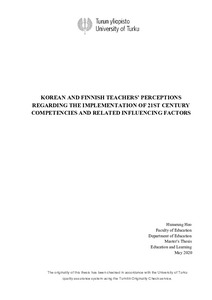KOREAN AND FINNISH TEACHERS’ PERCEPTIONS REGARDING THE IMPLEMENTATION OF 21ST CENTURY COMPETENCIES AND RELATED INFLUENCING FACTORS
Heo, Hunseung (2020-05-25)
KOREAN AND FINNISH TEACHERS’ PERCEPTIONS REGARDING THE IMPLEMENTATION OF 21ST CENTURY COMPETENCIES AND RELATED INFLUENCING FACTORS
Heo, Hunseung
(25.05.2020)
Julkaisu on tekijänoikeussäännösten alainen. Teosta voi lukea ja tulostaa henkilökohtaista käyttöä varten. Käyttö kaupallisiin tarkoituksiin on kielletty.
avoin
Julkaisun pysyvä osoite on:
https://urn.fi/URN:NBN:fi-fe2020070246755
https://urn.fi/URN:NBN:fi-fe2020070246755
Tiivistelmä
For the last few years, new national core curricula incorporating the concept of 21st century competencies have been implemented in South Korea and Finland. This study aims to examine how the 21st century competencies are reflected in the Korean and Finnish curricula, and teachers’ perceptions of implementing these 21st century competencies in practice, both in general and in relation to teacher autonomy and self-efficacy.
In the curriculum analysis, nine core concepts of 21st century competencies reflected in the curricula were derived and for these core concepts, it was examined how they were reflected in each curriculum. To investigate the teachers’ perceptions, a questionnaire targeting primary teachers working in Jeju Province and Southwest Finland was conducted to investigate differences between the Korean and Finnish teachers’ perceptions as well as relationships among the three concepts.
The findings revealed differences, not only in terms of the reflection ratios between the countries but also in Korean and Finnish teachers’ perceptions of their actual implementation of the competencies. Also, Korean teachers’ higher levels of belief regarding teacher autonomy and self-efficacy are associated with their higher levels implementation of 21st century competencies while this interconnectedness seems to be much less strong in Finland. Therefore, supporting teachers with lower perceived efficacy and autonomy might be a good approach to implement innovative ideas such as 21st century competencies in Korea, but not as much in Finland. Because of a variety of variations existing concerning the concepts, the results should be interpreted cautiously and comprehensively along with the particularity of the context.
In the curriculum analysis, nine core concepts of 21st century competencies reflected in the curricula were derived and for these core concepts, it was examined how they were reflected in each curriculum. To investigate the teachers’ perceptions, a questionnaire targeting primary teachers working in Jeju Province and Southwest Finland was conducted to investigate differences between the Korean and Finnish teachers’ perceptions as well as relationships among the three concepts.
The findings revealed differences, not only in terms of the reflection ratios between the countries but also in Korean and Finnish teachers’ perceptions of their actual implementation of the competencies. Also, Korean teachers’ higher levels of belief regarding teacher autonomy and self-efficacy are associated with their higher levels implementation of 21st century competencies while this interconnectedness seems to be much less strong in Finland. Therefore, supporting teachers with lower perceived efficacy and autonomy might be a good approach to implement innovative ideas such as 21st century competencies in Korea, but not as much in Finland. Because of a variety of variations existing concerning the concepts, the results should be interpreted cautiously and comprehensively along with the particularity of the context.
